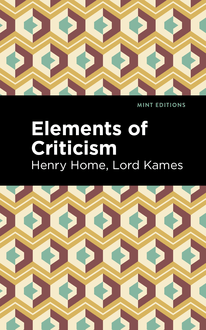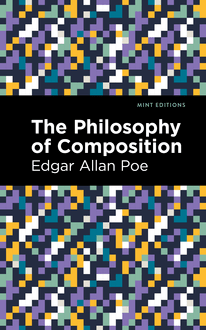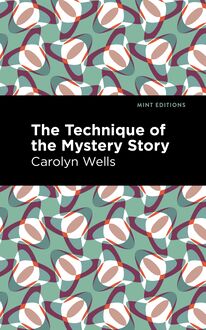-
 Univers
Univers
-
 Ebooks
Ebooks
-
 Livres audio
Livres audio
-
 Presse
Presse
-
 Podcasts
Podcasts
-
 BD
BD
-
 Documents
Documents
-
- Cours
- Révisions
- Ressources pédagogiques
- Sciences de l’éducation
- Manuels scolaires
- Langues
- Travaux de classe
- Annales de BEP
- Etudes supérieures
- Maternelle et primaire
- Fiches de lecture
- Orientation scolaire
- Méthodologie
- Corrigés de devoir
- Annales d’examens et concours
- Annales du bac
- Annales du brevet
- Rapports de stage
La lecture à portée de main
Vous pourrez modifier la taille du texte de cet ouvrage
Découvre YouScribe en t'inscrivant gratuitement
Je m'inscrisDécouvre YouScribe en t'inscrivant gratuitement
Je m'inscrisEn savoir plus
Vous pourrez modifier la taille du texte de cet ouvrage
En savoir plus

Description
Elements of Criticism (1762) is a philosophical work by Henry Home, Lord Kames. Published at the height of his career as a leading legal and cultural figure of the Scottish Enlightenment, Elements of Criticism has been credited as a crucial academic work in the development of modern English literary studies. “The science of criticism tends to improve the heart not less than the understanding…A just taste in the fine arts, by sweetening and harmonizing the temper, is a strong antidote to the turbulence of passion and violence of pursuit. Elegance of taste procures to a man so much enjoyment at home, or easily within reach, that in order to be occupied, he is, in youth, under no temptation to precipitate into hunting, gaming, drinking; nor, in middle age, to deliver himself over to ambition; nor, in old age, to avarice.” Although he is largely unheard of today, Henry Home was an integral figure in the elevation of the art of literary criticism as a subject in universities around Britain and the world. His central thesis is that criticism itself stems from the senses and directly relates to humanity’s capacity for reason. Through art, Home believed, humanity could live both morally and in harmony with the natural world, thereby creating a civilization rooted in virtue and creativity. With a beautifully designed cover and professionally typeset manuscript, this edition of Henry Home, Lord Kames’ Elements of Criticism is a classic of English literature reimagined for modern readers.
Sujets
Informations
| Publié par | Mint Editions |
| Date de parution | 16 novembre 2021 |
| Nombre de lectures | 0 |
| EAN13 | 9781513217260 |
| Langue | English |
| Poids de l'ouvrage | 1 Mo |
Informations légales : prix de location à la page 0,0650€. Cette information est donnée uniquement à titre indicatif conformément à la législation en vigueur.
Extrait
Elements of Criticism
Henry Home, Lord Kames
Elements of Criticism was first published in 1762.
This edition published by Mint Editions 2021.
ISBN 9781513218267 | E-ISBN 9781513217260
Published by Mint Editions®
minteditionbooks.com
Publishing Director: Jennifer Newens
Design & Production: Rachel Lopez Metzger
Project Manager: Micaela Clark
Typesetting: Westchester Publishing Services
C ONTENTS V OLUME I I NTRODUCTION I. P ERCEPTIONS AND IDEAS IN A TRAIN II. E MOTIONS AND P ASSIONS III. B EAUTY IV. G RANDEUR AND S UBLIMITY V. M OTION AND F ORCE VI. N OVELTY , AND THE UNEXPECTED APPEARANCE OF OBJECTS VII. R ISIBLE O BJECTS VIII. R ESEMBLANCE AND C ONTRAST IX. O F U NIFORMITY AND V ARIETY V OLUME II X. C ONGRUITY AND P ROPRIETY XI. O F D IGNITY AND M EANNESS XII. R IDICULE XIII. W IT XIV. C USTOM AND H ABIT XV. E XTERNAL S IGNS OF E MOTIONS AND P ASSIONS XVI. S ENTIMENTS XVII. L ANGUAGE OF P ASSION XVIII. B EAUTY OF L ANGUAGE V OLUME III XIX. C OMPARISONS XX. F IGURES XXI. N ARRATION AND D ESCRIPTION XXII. E PIC AND D RAMATIC C OMPOSITIONS XXIII. T HE THREE U NITIES XXIV. G ARDENING AND A RCHITECTURE XXV. S TANDARD OF T ASTE A PPENDIX
VOLUME I
I NTRODUCTION
T he five senses agree in the following particular, that nothing external is perceived till it first make an impression upon the organ of sense; the impression, for example, made upon the hand by a stone, upon the palate by sugar, and upon the nostrils by a rose. But there is a difference as to our consciousness of that impression. In touching, tasting, and smelling, we are conscious of the impression. Not so in seeing and hearing. When I behold a tree, I am not sensible of the impression made upon my eye; nor of the impression made upon my ear, when I listen to a song 1 . This difference in the manner of perception, distinguishes remarkably hearing and seeing from the other senses; and distinguishes still more remarkably the feelings of the former from those of the latter. A feeling pleasant or painful cannot exist but in the mind; and yet because in tasting, touching, and smelling, we are conscious of the impression made upon the organ, we naturally place there also, the pleasant or painful feeling caused by that impression. And because such feelings seem to be placed externally at the organ of sense, we, for that reason, conceive them to be merely corporeal. We have a different apprehension of the pleasant and painful feelings derived from seeing and hearing. Being insensible here of the organic impression, we are not misled to assign a wrong place to these feelings; and therefore we naturally place them in the mind, where they really exist. Upon that account, they are conceived to be more refined and spiritual, than what are derived from tasting, touching, and smelling.
The pleasures of the eye and ear being thus elevated above those of the other external senses, acquire so much dignity as to make them a laudable entertainment. They are not, however, set upon a level with those that are purely intellectual; being not less inferior in dignity to intellectual pleasures, than superior to the organic or corporeal. They indeed resemble the latter, being like them produced by external objects: but they also resemble the former, being like them produced without any sensible organic impression. Their mixt nature and middle place betwixt organic and intellectual pleasures, qualify them to associate with either. Beauty heightens all the organic feelings, as well as those that are intellectual. Harmony, though it aspires to inflame devotion, disdains not to improve the relish of a banquet.
The pleasures of the eye and ear have other valuable properties beside those of dignity and elevation. Being sweet and moderately exhilerating, they are in their tone equally distant from the turbulence of passion, and languor of inaction; and by that tone are perfectly well qualified, not only to revive the spirits when sunk by sensual gratification, but also to relax them when overstrained in any violent pursuit. Here is a remedy provided for many distresses. And to be convinced of its salutary effects, it will be sufficient to run over the following particulars. Organic pleasures have naturally a short duration: when continued too long, or indulged to excess, they lose their relish, and beget satiety and disgust. To relieve us from that uneasiness, nothing can be more happily contrived than the exhilerating pleasures of the eye and ear, which take place imperceptibly, without much varying the tone of mind. On the other hand, any intense exercise of the intellectual powers, becomes painful by overstraining the mind. Cessation from such exercise gives not instant relief: it is necessary that the void be filled with some amusement, gently relaxing the spirits 2 . Organic pleasure, which hath no relish but while we are in vigour, is ill qualified for that office: but the finer pleasures of sense, which occupy without exhausting the mind, are excellently well qualified to restore its usual tone after severe application to study or business, as well as after satiety from sensual gratification.
Our first perceptions are of external objects, and our first attachments are to them. Organic pleasures take the lead. But the mind, gradually ripening, relisheth more and more the pleasures of the eye and ear; which approach the purely mental, without exhausting the spirits; and exceed the purely sensual, without danger of satiety. The pleasures of the eye and ear have accordingly a natural aptitude to attract us from the immoderate gratification of sensual appetite. For the mind, once accustomed to enjoy a variety of external objects without being conscious of the organic impression, is prepared for enjoying internal objects where there cannot be an organic impression. Thus the author of nature, by qualifying the human mind for a succession of enjoyments from the lowest to the highest, leads it by gentle steps from the most groveling corporeal pleasures, for which solely it is fitted in the beginning of life, to those refined and sublime pleasures which are suited to its maturity.
This succession, however, is not governed by unavoidable necessity. The God of nature offers it to us, in order to advance our happiness; and it is sufficient, that he hath enabled us to complete the succession. Nor has he made our task disagreeable or difficult. On the contrary, the transition is sweet and easy, from corporeal pleasures to the more refined pleasures of sense; and not less so, from these to the exalted pleasures of morality and religion. We stand therefore engaged in honour, as well as interest, to second the purposes of nature, by cultivating the pleasures of the eye and ear, those especially that require extraordinary culture 3 , such as are inspired by poetry, painting, sculpture, music, gardening, and architecture. This chiefly is the duty of the opulent, who have leisure to improve their minds and their feelings. The fine arts are contrived to give pleasure to the eye and the ear, disregarding the inferior senses. A taste for these arts is a plant that grows naturally in many soils; but, without culture, scarce to perfection in any soil. It is susceptible of much refinement; and is, by proper care, greatly improved. In this respect, a taste in the fine arts goes hand in hand with the moral sense, to which indeed it is nearly allied. Both of them discover what is right and what is wrong. Fashion, temper, and education, have an influence upon both, to vitiate them, or to preserve them pure and untainted. Neither of them are arbitrary or local. They are rooted in human nature, and are governed by principles common to all men. The principles of morality belong not to the present undertaking. But as to the principles of the fine arts, they are evolved, by studying the sensitive part of human nature, and by learning what objects are naturally agreeable, and what are naturally disagreeable. The man who aspires to be a critic in these arts, must pierce still deeper. He must clearly perceive what objects are lofty, what low, what are proper or improper, what are manly, and what are mean or trivial. Hence a foundation for judging of taste, and for reasoning upon it. Where it is conformable to principles, we can pronounce with certainty, that it is correct; otherwise, that it is incorrect, and perhaps whimsical. Thus the fine arts, like morals, become a rational science; and, like morals, may be cultivated to a high degree of refinement.
Manifold are the advantages of criticism, when thus studied as a rational science. In the first place, a thorough acquaintance with the principles of the fine arts, redoubles the entertainment these arts afford. To the man who resigns himself entirely to sentiment or feeling, without interposing any sort of judgment, poetry, music, painting, are mere pastime. In the prime of life, indeed, they are delightful, being supported by the force of novelty, and the heat of imagination. But they lose their relish gradually with their novelty; and are generally neglected in the maturity of life, which disposes to more serious and more important occupations. To those who deal in criticism as a regular science, governed by just principles, and giving scope to judgment as well as to fancy, the fine arts are a favourite entertainment; and in old age maintain that relish which they produce in the morning of life 4 .
In the next place, a philosophic inquiry into the principles of the fine arts, inures the reflecting mind to the most enticing sort of logic. Reasoning upon subjects so agreeable tends to a habit; and a habit, strengthening the reasoning faculties, prepares the mind for entering into subjects more difficult and abstract. To have, in this respect, a just conception of the importance of criticism, we need but reflect upon the common method of education; which, after some years spent in acquiring languages, hurries us, without the least preparatory di
-
 Univers
Univers
-
 Ebooks
Ebooks
-
 Livres audio
Livres audio
-
 Presse
Presse
-
 Podcasts
Podcasts
-
 BD
BD
-
 Documents
Documents
-
Jeunesse
-
Littérature
-
Ressources professionnelles
-
Santé et bien-être
-
Savoirs
-
Education
-
Loisirs et hobbies
-
Art, musique et cinéma
-
Actualité et débat de société
-
Jeunesse
-
Littérature
-
Ressources professionnelles
-
Santé et bien-être
-
Savoirs
-
Education
-
Loisirs et hobbies
-
Art, musique et cinéma
-
Actualité et débat de société
-
Actualités
-
Lifestyle
-
Presse jeunesse
-
Presse professionnelle
-
Pratique
-
Presse sportive
-
Presse internationale
-
Culture & Médias
-
Action et Aventures
-
Science-fiction et Fantasy
-
Société
-
Jeunesse
-
Littérature
-
Ressources professionnelles
-
Santé et bien-être
-
Savoirs
-
Education
-
Loisirs et hobbies
-
Art, musique et cinéma
-
Actualité et débat de société
- Cours
- Révisions
- Ressources pédagogiques
- Sciences de l’éducation
- Manuels scolaires
- Langues
- Travaux de classe
- Annales de BEP
- Etudes supérieures
- Maternelle et primaire
- Fiches de lecture
- Orientation scolaire
- Méthodologie
- Corrigés de devoir
- Annales d’examens et concours
- Annales du bac
- Annales du brevet
- Rapports de stage










